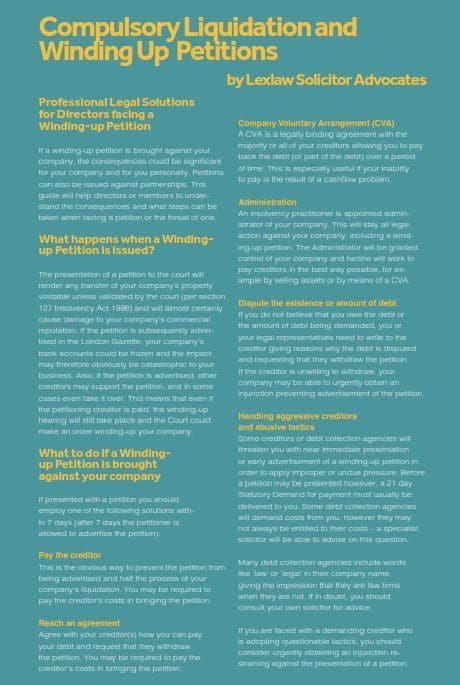The presentation of a winding up petition to the court is the first stage of the winding up (or, as it is also known, compulsory liquidation) process. It means that the petitioner is attempting to have the company compulsorily put into liquidation by the court.
The reasons why a person might seek to have a company wound up are broad ranging. The most common reason is that the company has become unable to pay debts owing to its creditors (see section 122(1)(f), Insolvency Act 1986 (1986 Act)).
However, winding up proceedings are not restricted to situations where companies have become insolvent. For example, the Secretary of State has power to present a petition to wind up a company where it is in the public interest to do so (section 124A, 1986 Act). Alternatively, where a dispute arises between the shareholders of a company, one or more of the shareholders may seek to have the company wound up on the ground that it is “just and equitable” to do so (section 122(1)(g), 1986 Act).
Typically a creditor asks a solicitor to wind the debtor company up to recover debts which exceed £750, or to stop the company making its debts worse.
An application is made to the court (this is the petition) to seek an order to wind the company up. Directors should react when a petition is received; the consequences are that you could lose control and/or even face personal liability for the debts.
The Court will grant a hearing date to “hear” the petition. If the company does not respond, or if no defence is mounted, then its usually a matter of the judge issuing the order to wind up.
Compulsory Liquidation and Winding up Petition Advice for Directors
Our specialist insolvency team regularly provide market leading advice to directors of companies and limited liability partnerships. Our work has featured in KSA Group‘s Worried Directors Guide 2018, including our authoritative guide on compulsory liquidation and winding up petitions.

If you are owed more than £750 by a company and the debt is undisputed (for example a judgment debt) or you are a company facing a winding-up petition, we can negotiate on your behalf and advise you through the insolvency and Companies Court process. Our Winding-Up Experts are able to give specialist legal information and advice to you. To contact one of our Solicitors or Barristers please click here or call 02071830529.
